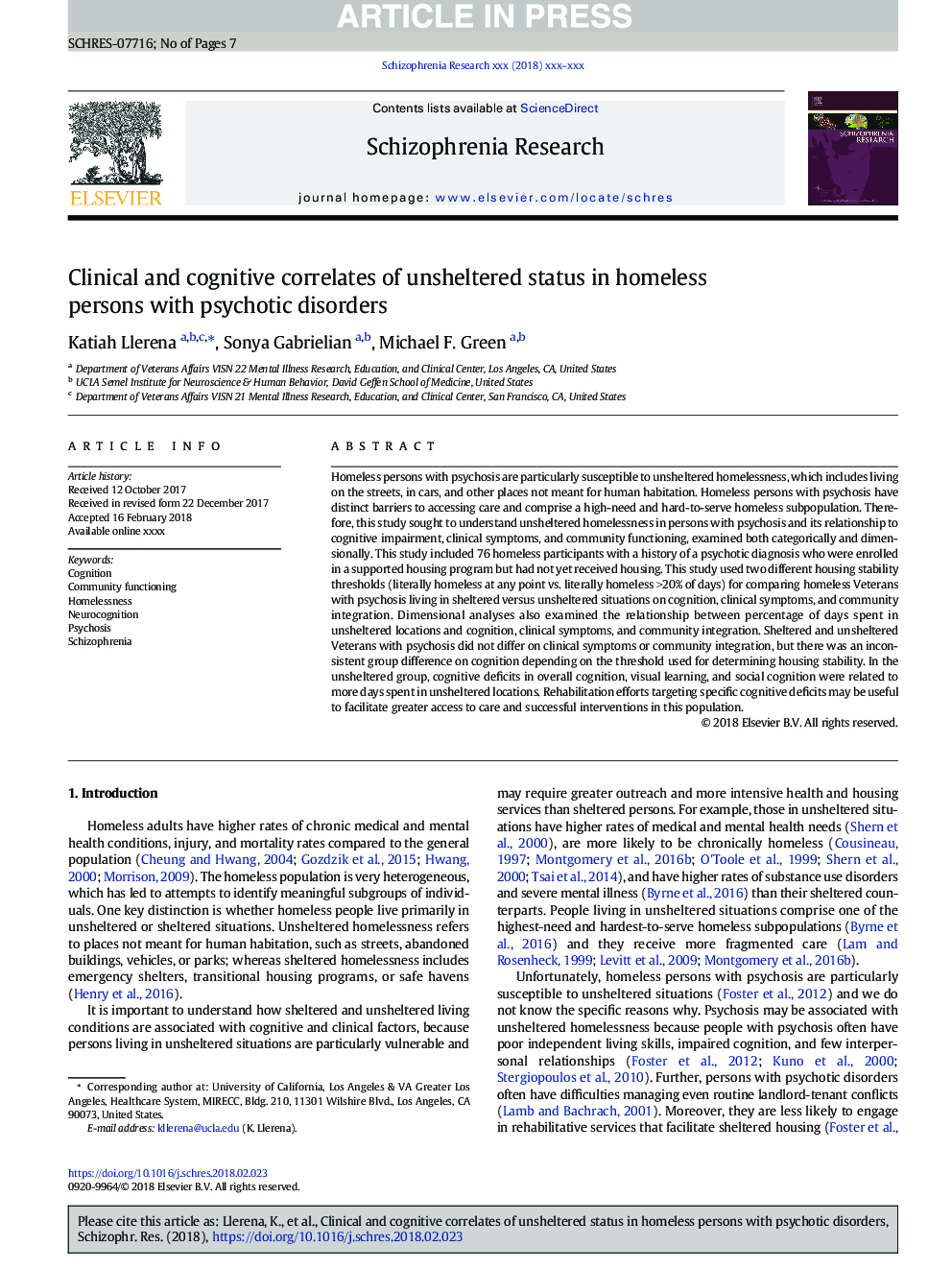| کد مقاله | کد نشریه | سال انتشار | مقاله انگلیسی | نسخه تمام متن |
|---|---|---|---|---|
| 6820893 | 1434046 | 2018 | 7 صفحه PDF | دانلود رایگان |
عنوان انگلیسی مقاله ISI
Clinical and cognitive correlates of unsheltered status in homeless persons with psychotic disorders
ترجمه فارسی عنوان
همبستگیهای بالینی و شناختی وضعیت غیر بهداشتی در افراد بیخانمان با اختلالات روانی
دانلود مقاله + سفارش ترجمه
دانلود مقاله ISI انگلیسی
رایگان برای ایرانیان
کلمات کلیدی
شناخت، عملکرد جامعه، بی خانمانی، شناخت عصبی، روانپریشی جنون جوانی،
ترجمه چکیده
افراد بیخانمان با روانپزشکی به خصوص برای بی خانمانهای غیرقانونی حساس هستند که شامل زندگی در خیابان ها، اتومبیل ها و مکان های دیگر برای زندگی انسان نمی شود. افراد بی خانمان با روان درمانی موانع متفاوتی برای دسترسی به مراقبت دارند و جمعیت کم جمعیتی که نیاز به کمبود و سختی در اختیار دارند، تشکیل شده است. بنابراین، این مطالعه به دنبال بی خانمانی غیر محافظت در افراد مبتلا به روانپزشک و ارتباط آن با نقص شناختی، علایم بالینی و کارکرد اجتماعی است که هر دو به صورت دسته بندی و ابعاد مورد بررسی قرار می گیرند. این مطالعه شامل 76 شرکت کننده بی خانمان با سابقه تشخیص روانپریشی بود که در یک برنامه حمایت از مسکن ثبت نام کرده بود اما هنوز مسکن دریافت نکرده بود. این مطالعه برای مقایسه دو جانباز بی خانمان با روانپزشکی که در شرایط سرپایی و غیر بهداشتی در شناخت، علائم بالینی و ادغام جامعه زندگی می کند، از دو آستانه پایداری مسکن استفاده می کند (به معنای واقعی کلمه بی خانمان در هر نقطه به معنای واقعی کلمه بی خانمان> 20٪ روز). تجزیه و تحلیل های ابعاد نیز بررسی رابطه بین درصد روزهای صرف شده در مکان های غیر بهداشتی و شناخت، علائم بالینی و ادغام جامعه را مورد بررسی قرار داد. سرپناه و محافظت نشده جانبازان مبتلا به روانپریشی بر علائم بالینی و یا یکپارچگی جامعه تفاوت نیافت، اما بر اساس شناختی که بر اساس آستانه استفاده شده برای تعیین ثبات مسکن، اختلاف بین گروهی وجود دارد. در گروه غیر محافظ، نقص شناختی در شناخت کلی، یادگیری بصری و شناخت اجتماعی به روزهای بیشتری که در محل های حفاظت نشده صرف می شود، مرتبط بود. تلاش های توانبخشی در زمینه نقص شناختی خاص ممکن است برای تسهیل دسترسی بیشتر به مراقبت و مداخلات موفق در این جمعیت مفید باشد.
موضوعات مرتبط
علوم زیستی و بیوفناوری
علم عصب شناسی
علوم اعصاب رفتاری
چکیده انگلیسی
Homeless persons with psychosis are particularly susceptible to unsheltered homelessness, which includes living on the streets, in cars, and other places not meant for human habitation. Homeless persons with psychosis have distinct barriers to accessing care and comprise a high-need and hard-to-serve homeless subpopulation. Therefore, this study sought to understand unsheltered homelessness in persons with psychosis and its relationship to cognitive impairment, clinical symptoms, and community functioning, examined both categorically and dimensionally. This study included 76 homeless participants with a history of a psychotic diagnosis who were enrolled in a supported housing program but had not yet received housing. This study used two different housing stability thresholds (literally homeless at any point vs. literally homeless >20% of days) for comparing homeless Veterans with psychosis living in sheltered versus unsheltered situations on cognition, clinical symptoms, and community integration. Dimensional analyses also examined the relationship between percentage of days spent in unsheltered locations and cognition, clinical symptoms, and community integration. Sheltered and unsheltered Veterans with psychosis did not differ on clinical symptoms or community integration, but there was an inconsistent group difference on cognition depending on the threshold used for determining housing stability. In the unsheltered group, cognitive deficits in overall cognition, visual learning, and social cognition were related to more days spent in unsheltered locations. Rehabilitation efforts targeting specific cognitive deficits may be useful to facilitate greater access to care and successful interventions in this population.
ناشر
Database: Elsevier - ScienceDirect (ساینس دایرکت)
Journal: Schizophrenia Research - Volume 197, July 2018, Pages 421-427
Journal: Schizophrenia Research - Volume 197, July 2018, Pages 421-427
نویسندگان
Katiah Llerena, Sonya Gabrielian, Michael F. Green,
